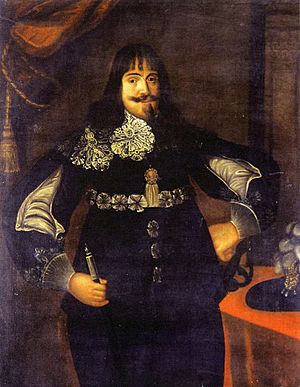James Lumsden (military officer) facts for kids
James Lumsden (1598–1660) was a brave Scottish soldier. He fought in the Swedish army during a big European conflict called the Thirty Years' War. Later, he led Scottish armies known as the Covenanters. The Covenanters were Scots who had signed agreements (Covenants) to protect their Presbyterian church and its independence.
Contents
Early Military Career
James Lumsden started his military journey in Sweden. He led a group of Scottish soldiers there. He fought in important battles, including the Battle of Lützen in 1632. This battle was a major event in the Thirty Years' War. Lumsden was part of a famous fighting group called John Hepburn's Green Brigade.
Governor of Osnabrück
In May 1634, Lumsden was given a big responsibility. He became the governor of Osnabrück, a city in Germany. He held this city with his regiment for two years. He faced many challenges during this time. In 1636, another Scottish leader, Field Marshal Alexander Leslie, took over from him.
Return to Scotland
By 1639, many Scottish officers, including Lumsden, left the Swedish army. They returned to Scotland. Back home, Lumsden quickly became involved in new conflicts. He commanded troops during the Bishop's Wars. These wars were fought between Scotland and King Charles I over religious differences.
Role in the English Civil War
In 1644, Lumsden joined General Alexander Leslie's Covenanter Army. This army went to England to help the English Parliament. They were fighting against King Charles I in the First English Civil War. Lumsden held an important position as Sergeant Major General of Foot. This meant he was a senior officer in charge of the infantry (foot soldiers).
Battle of Marston Moor
Lumsden played a key role in the Battle of Marston Moor. This was one of the biggest battles of the English Civil War. Even though some of his own soldiers were forced to retreat, Lumsden showed great leadership. He helped gather the remaining troops. He also rallied other groups of soldiers. This effort helped the Parliament's forces win the battle. Lumsden later wrote about his experiences in the battle.
Later Years and Capture
After the English Civil War, Lumsden continued to serve. He became Lieutenant General of Horse in the Covenanter Army. This meant he was a high-ranking officer in charge of the cavalry (soldiers on horseback). This army later fought for King Charles II.
Defeat at Dunbar
In 1650, Lumsden's army faced a major defeat. They were beaten at the Battle of Dunbar. During this battle, Lumsden was captured. He was held prisoner for some time. He was finally released in 1652.
 | Ernest Everett Just |
 | Mary Jackson |
 | Emmett Chappelle |
 | Marie Maynard Daly |


